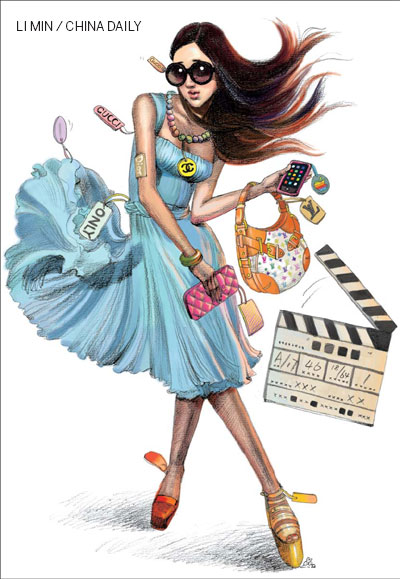Branding the movies

Chinese movies might not use product placement on the scale of Hollywood, but the domestic film industry is keen to get in on the act.
In Xu Jinglei's recent romantic hit Go Lala Go, the protagonist wins her love interest by handing him a hot cup of Lipton tea when he is tired. Go Lala Go has been widely judged a successful case of product placement. Various companies provided two thirds of the film's budget in order to appear in the romantic comedy. China only started product placement in films a few years ago, but the practice is enjoying a rapid growth.
Metersbonwe, a Shanghai-based sportswear company, even paid to appear for less than a second on a billboard in Transformers 2.
But the company also got to make a TV commercial, in which a Transformer chases a boy to a street corner just to give him a Metersbonwe shirt.
Sirena Liu, who runs her own company FilmWorks Entertainment Marketing, the official agency for DreamWorks Animation and Paramount International in China, said on the back of the tie-in Metersbonwe sold some 10,000 Transformers t-shirts in a week in its Shanghai flagship shop.
Liu is working on putting Chinese companies' products into Transformers 3 and Steven Spielberg's Tintin.
But she points out many Chinese companies have yet to learn about the rules of product placement.
"They often ask for how many seconds will their products appear in the film or how much of the film is about their products before the shooting starts," Liu said at a forum on marketing strategies during the Shanghai International Film Festival, which ended on June 20.
"Actually we don't know until the edited movie is released."
For most Chinese directors, product placement is not as easy as it seems.
Wang Xiaoshuai, an arthouse director, says he wants cooperation from brands to lower the cost of his films, most of which do not perform very well at local box office, but often fails.
"I was still waiting when I started shooting Chongqing Blues," he talks about his latest work that competed at Cannes 2010. "But nobody wanted to place their products in the film."
His fellow director Zhang Yang agrees that it is hard for arthouse films to attract product placement now, even worldwide.
In shooting his urban romance Driverless, which is due for release on July 2, his producer found a company who would provide cars for the shoot but asked for an exclusive brand showing. However, Zhang did not think the two cars suited the characters well. He argued with the producer for days, with the cars parked outside the studio.
"The film is about people and their cars," he said. "I considered the cars to be the part of the cast."
However, it is the opposite problem for famous director Feng Xiaogang. Too many brands want to appear in his films, often the box office champions of the year.
Feng was said to have smashed the products furiously on the set after shooting his romantic comedy If You are the One, because his producers pushed him to put more products in the film.
After the film premiered, he apologized to the viewers for placing too many products in it.
Hong Kong director Pang Ho-Cheung says that some films are "shameless" in their use of product placement and become 90-minute advertisements.
"Products placement is a good thing, but the premise is not to destroy the story's completeness and the viewers' enjoyment," he says.
"When the plot is triggered by some product that makes the story more complete and the character more interesting - that's the best use of product placement," said Tomaz Mok, vice president of McCann Erickson China at the forum.
 0
0 







Go to Forum >>0 Comments